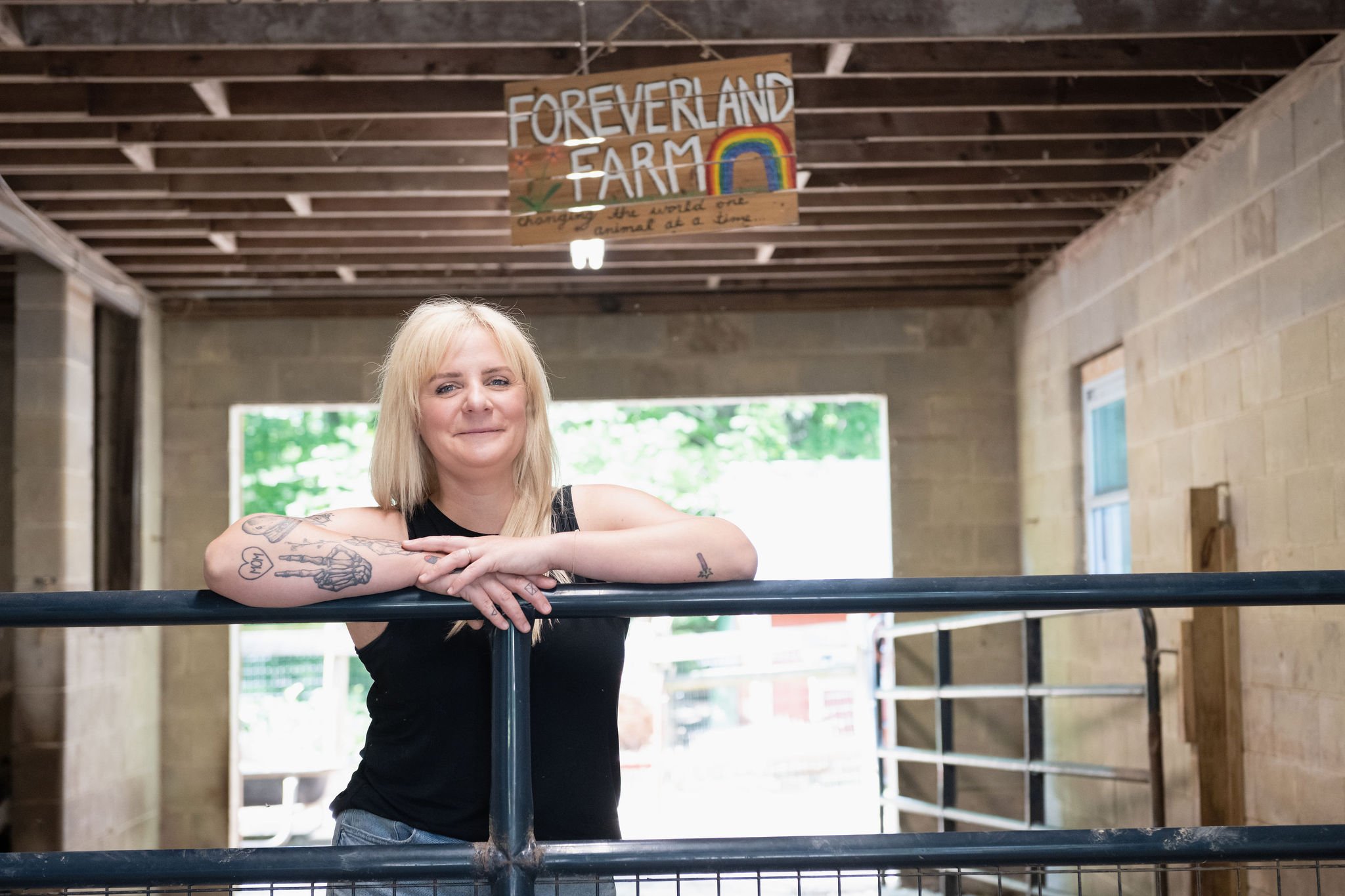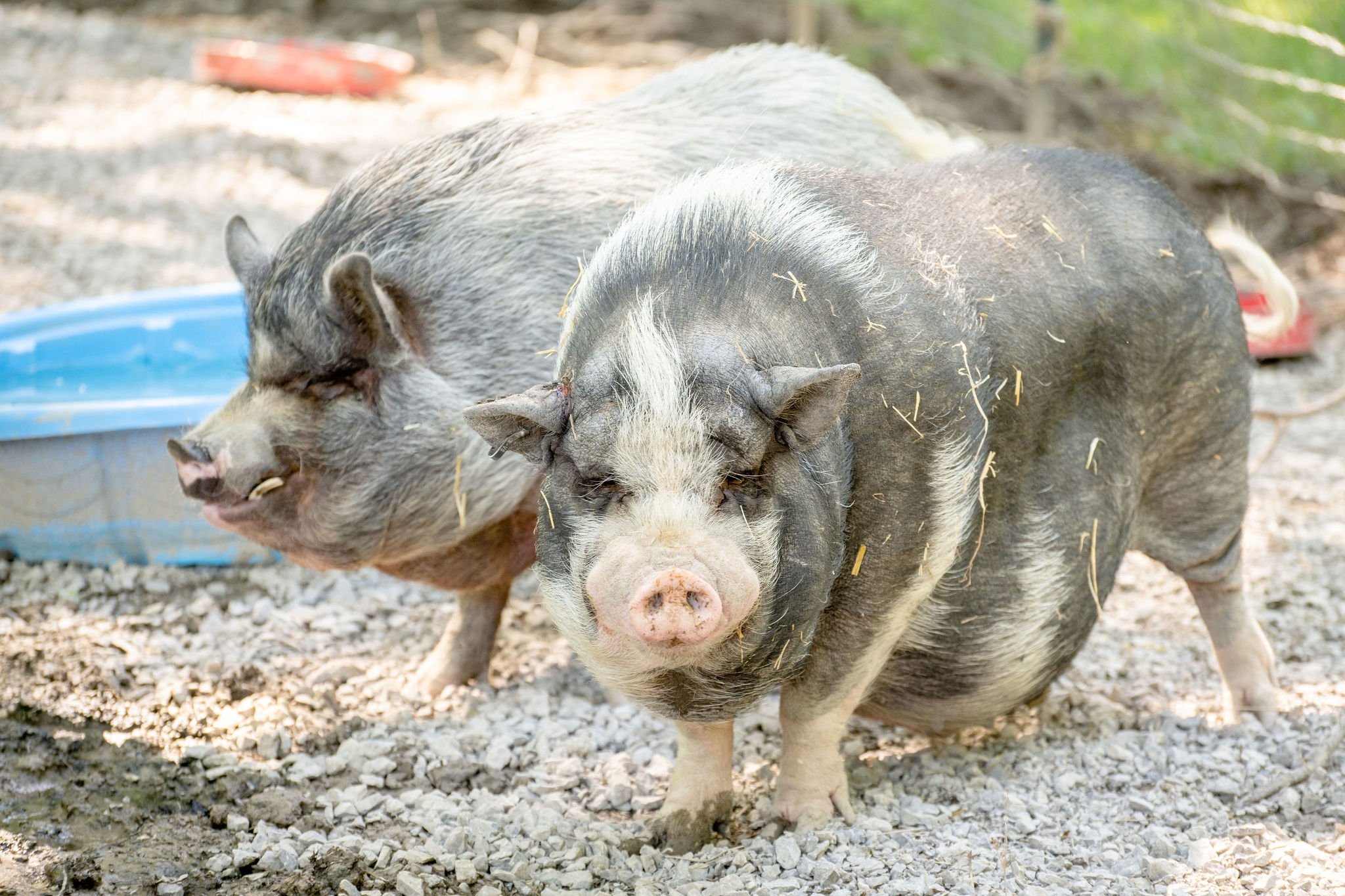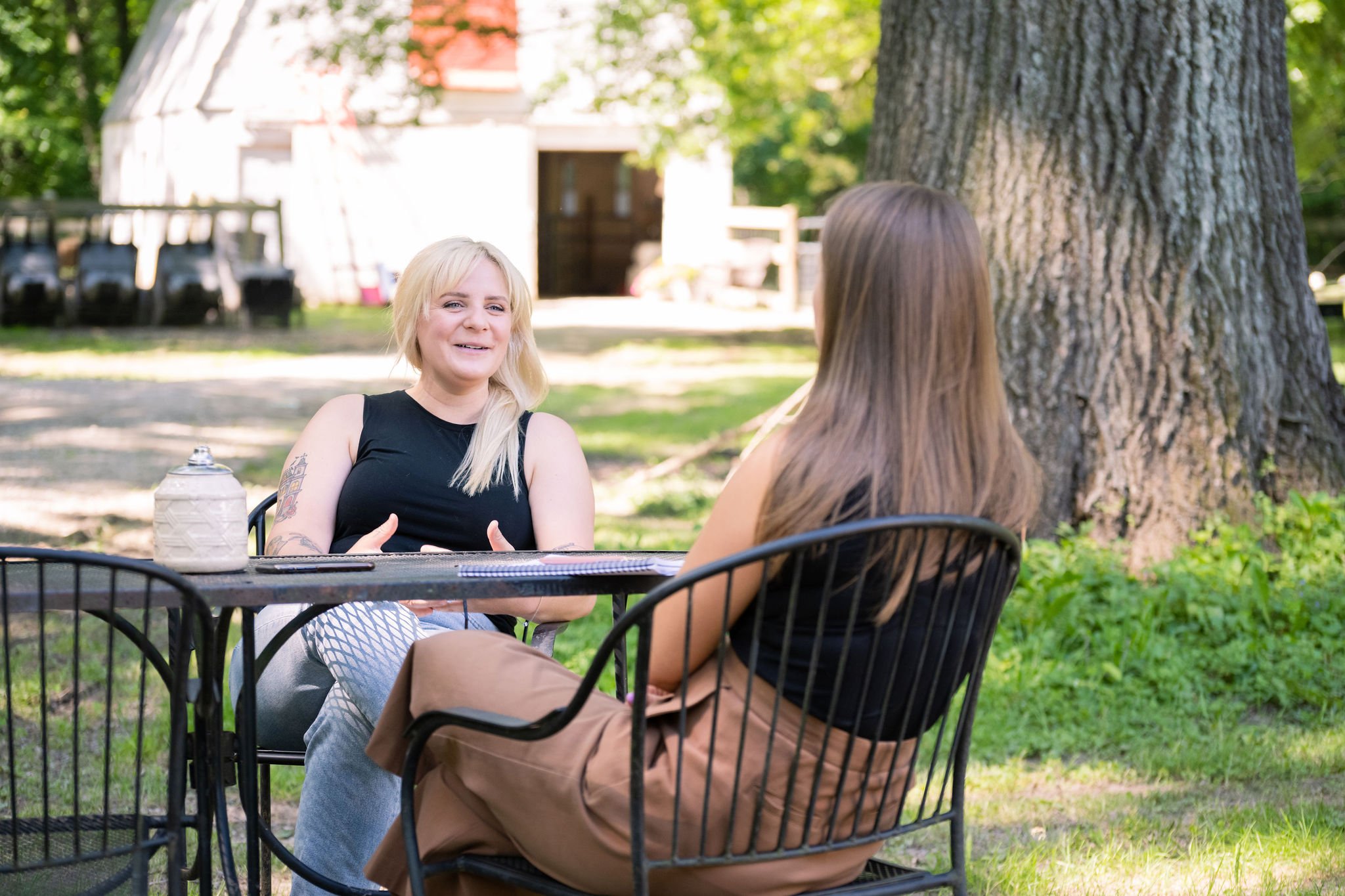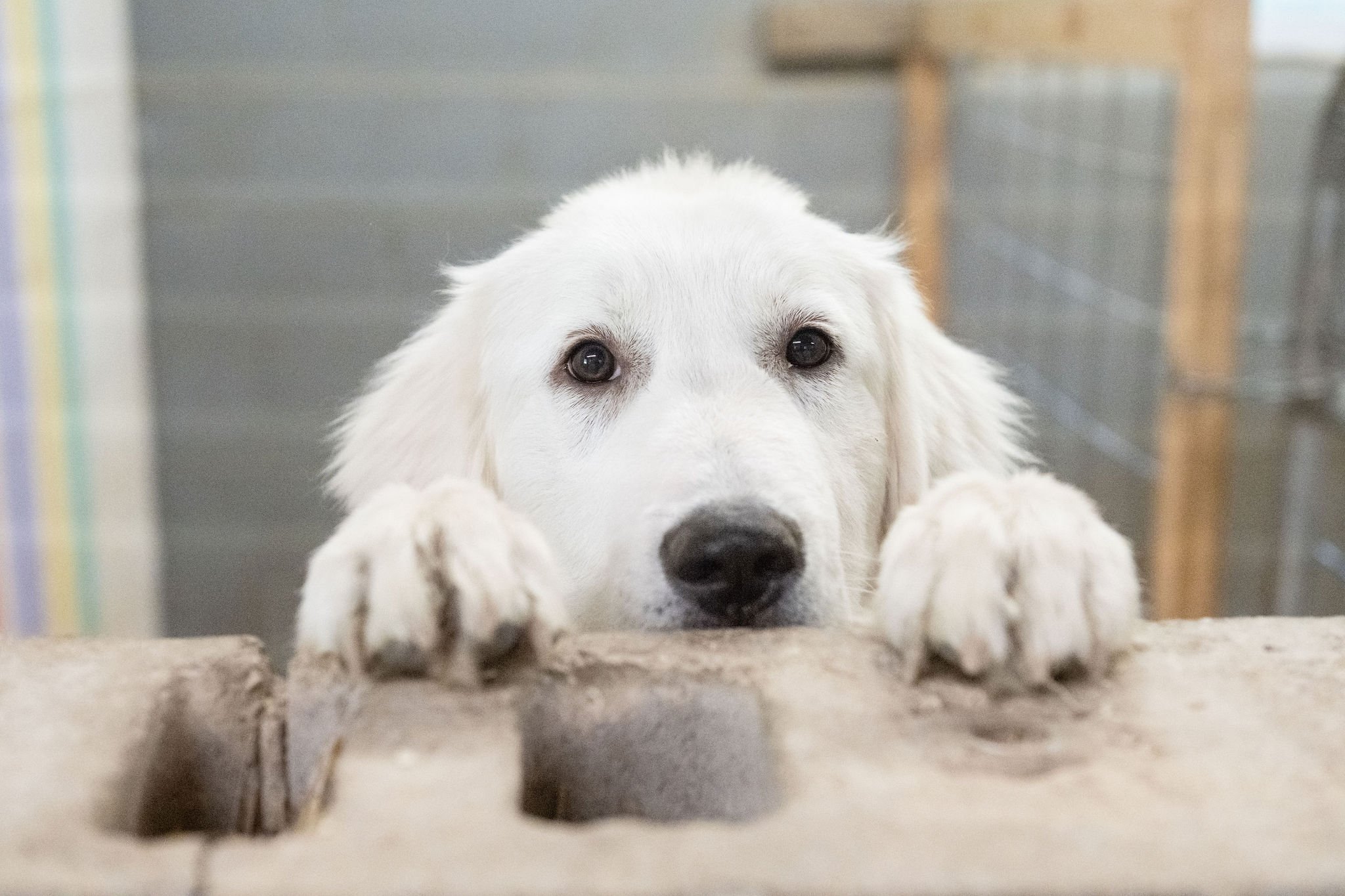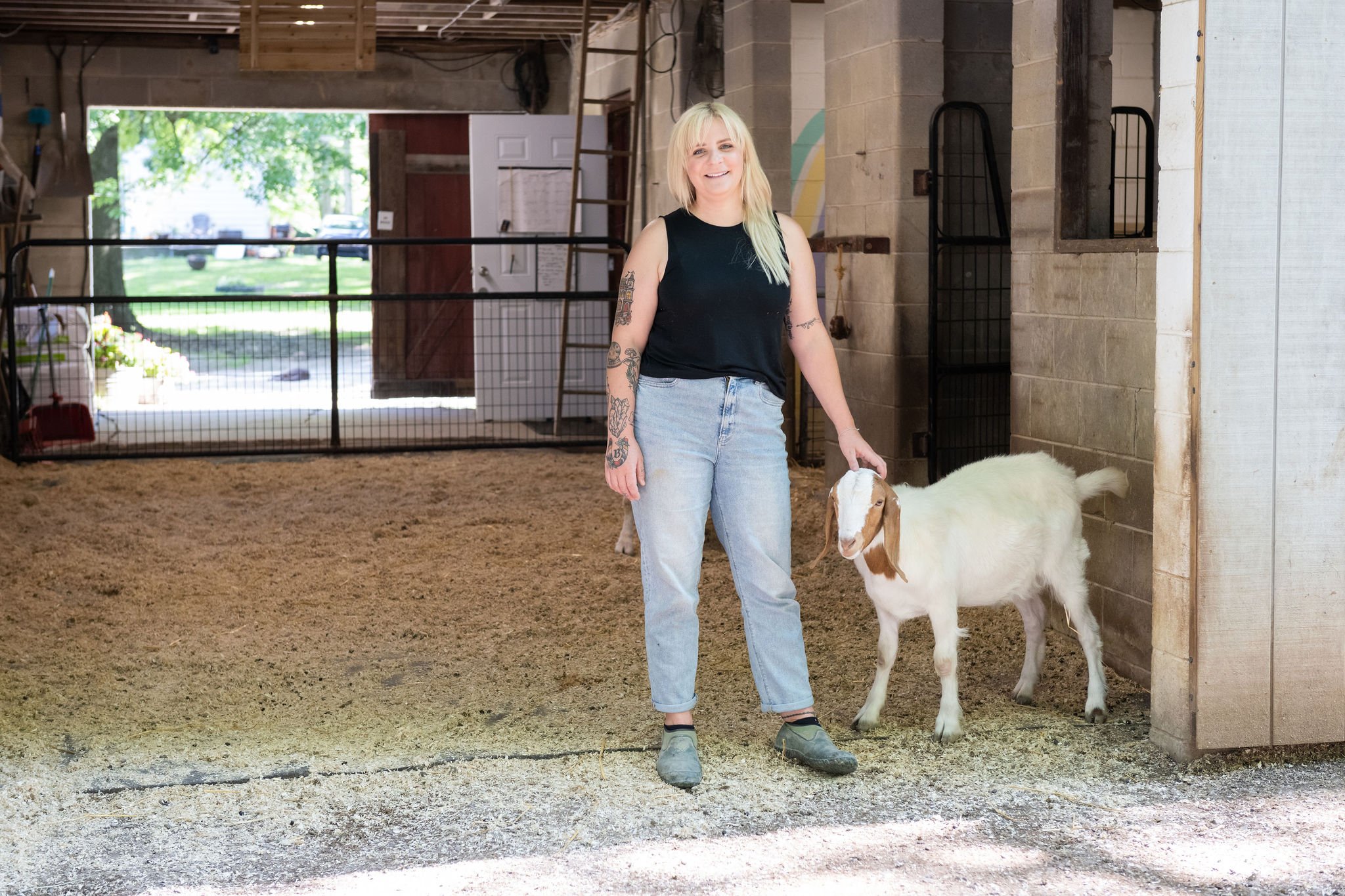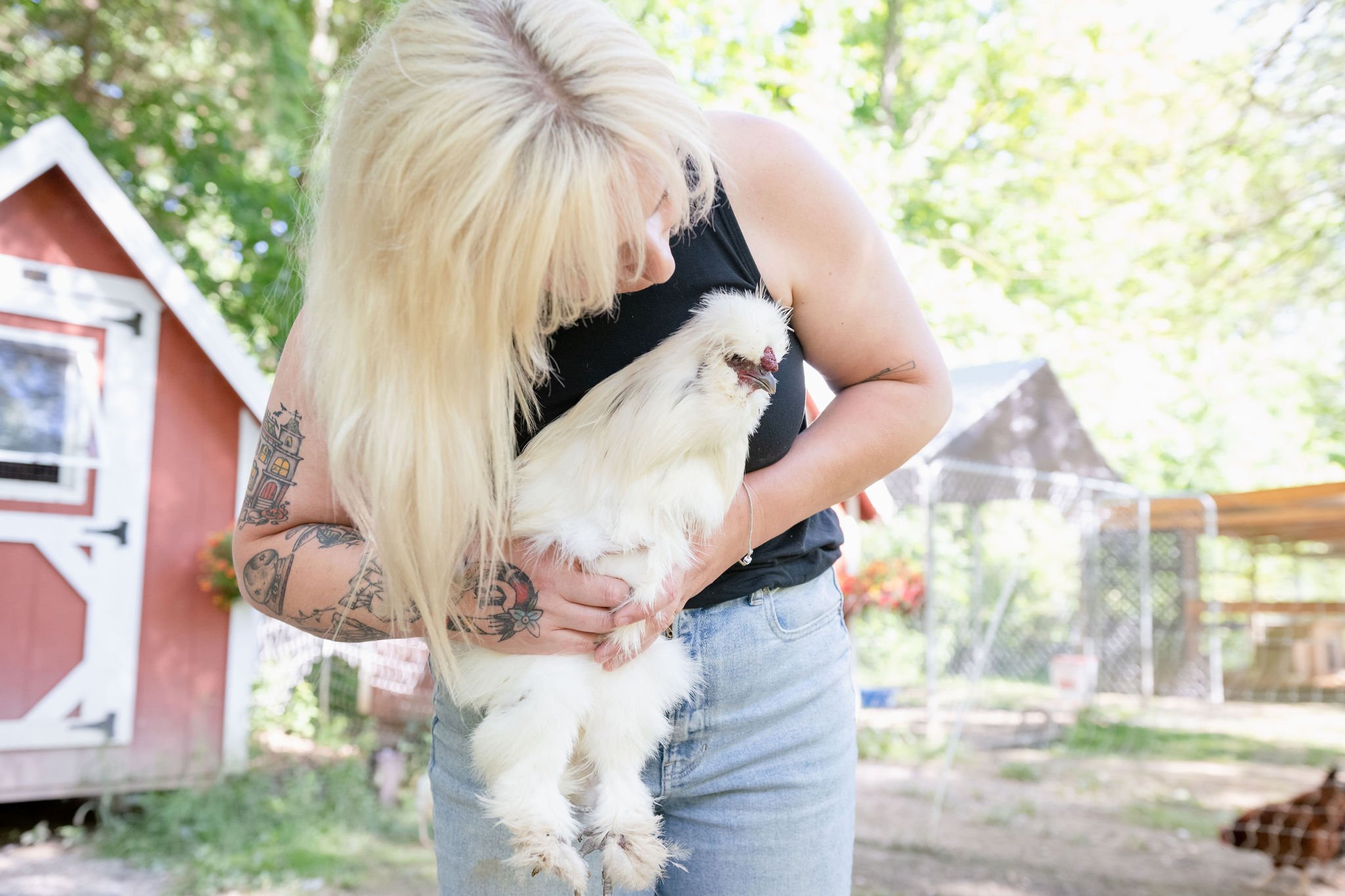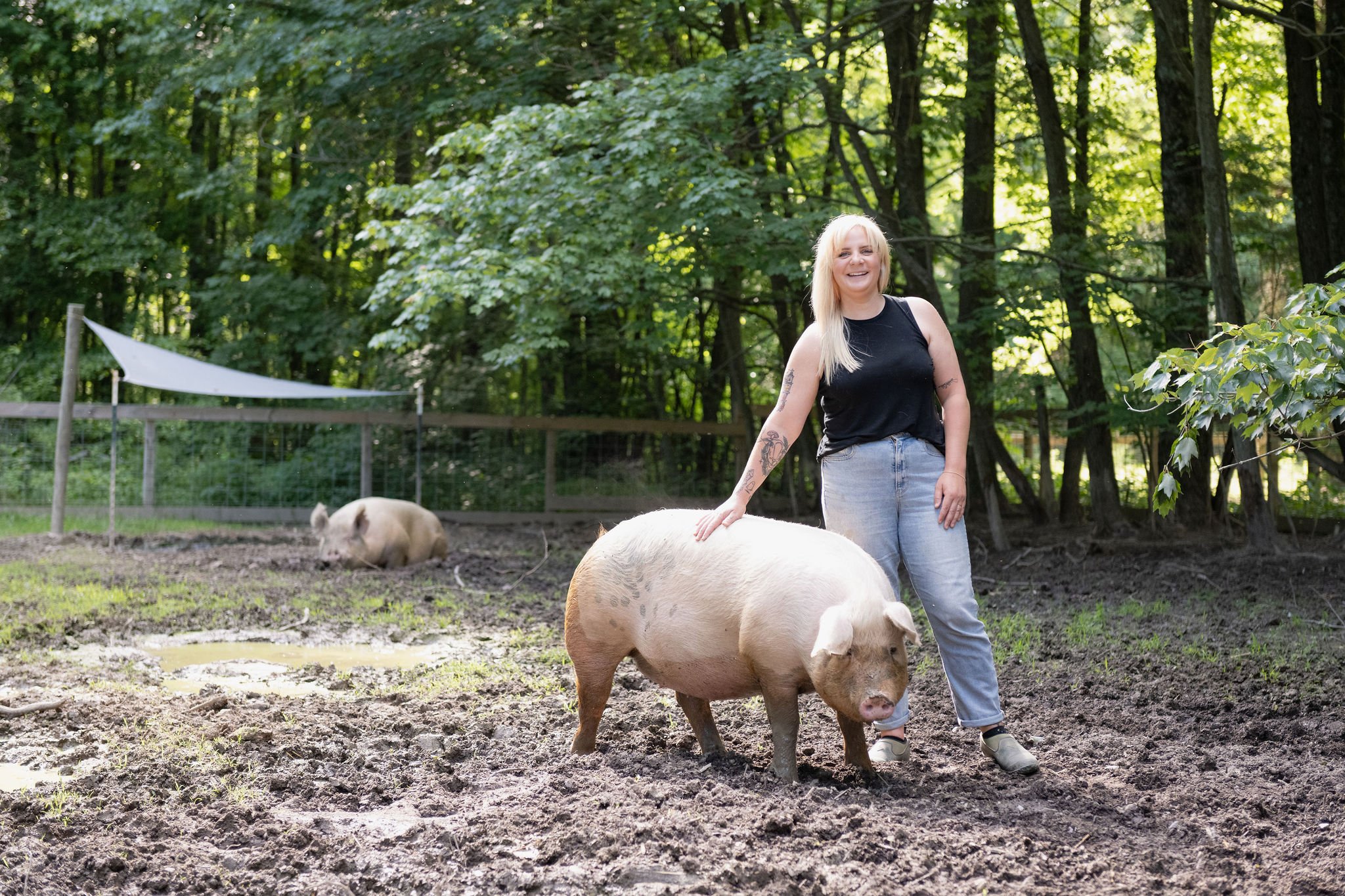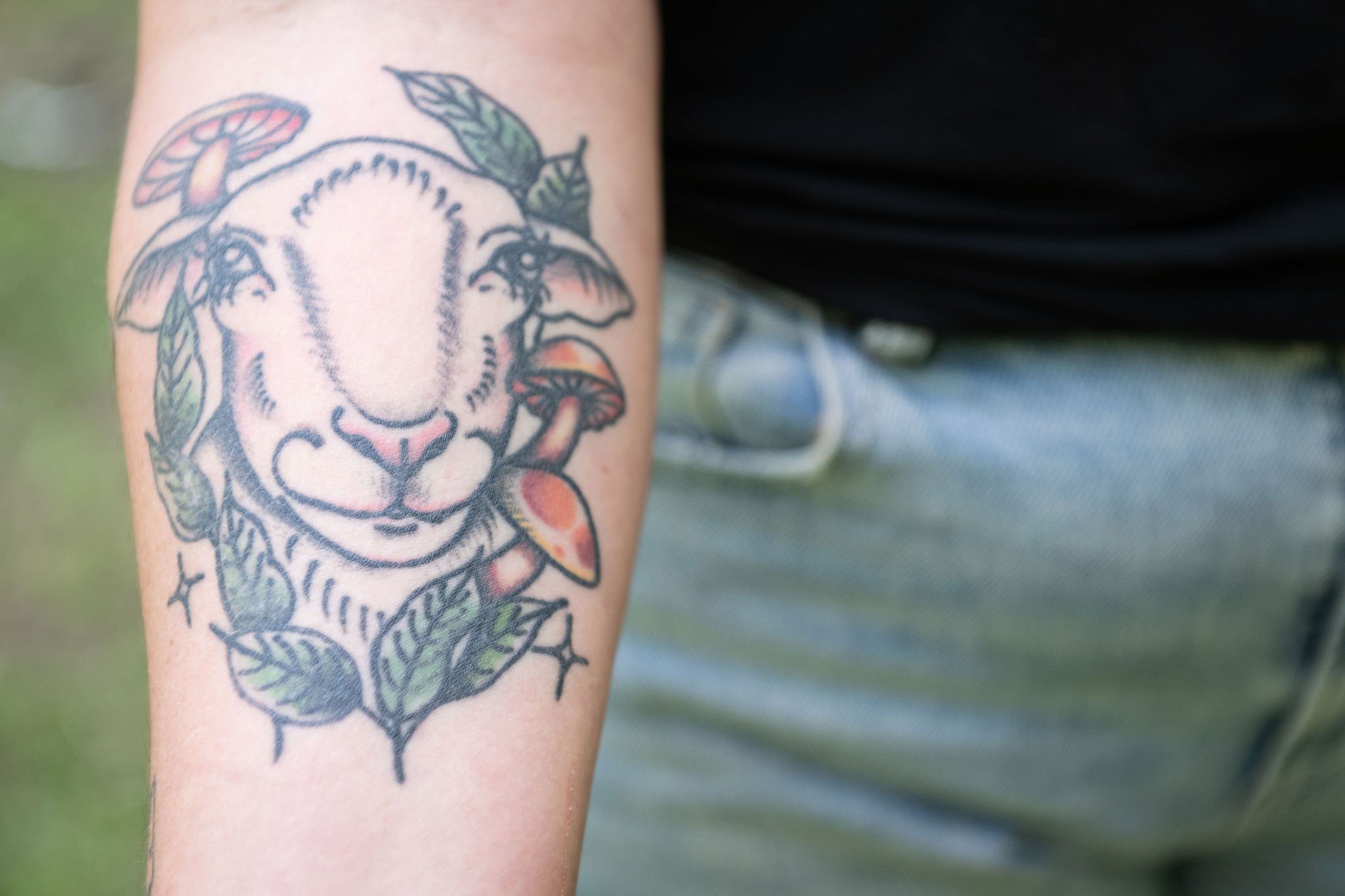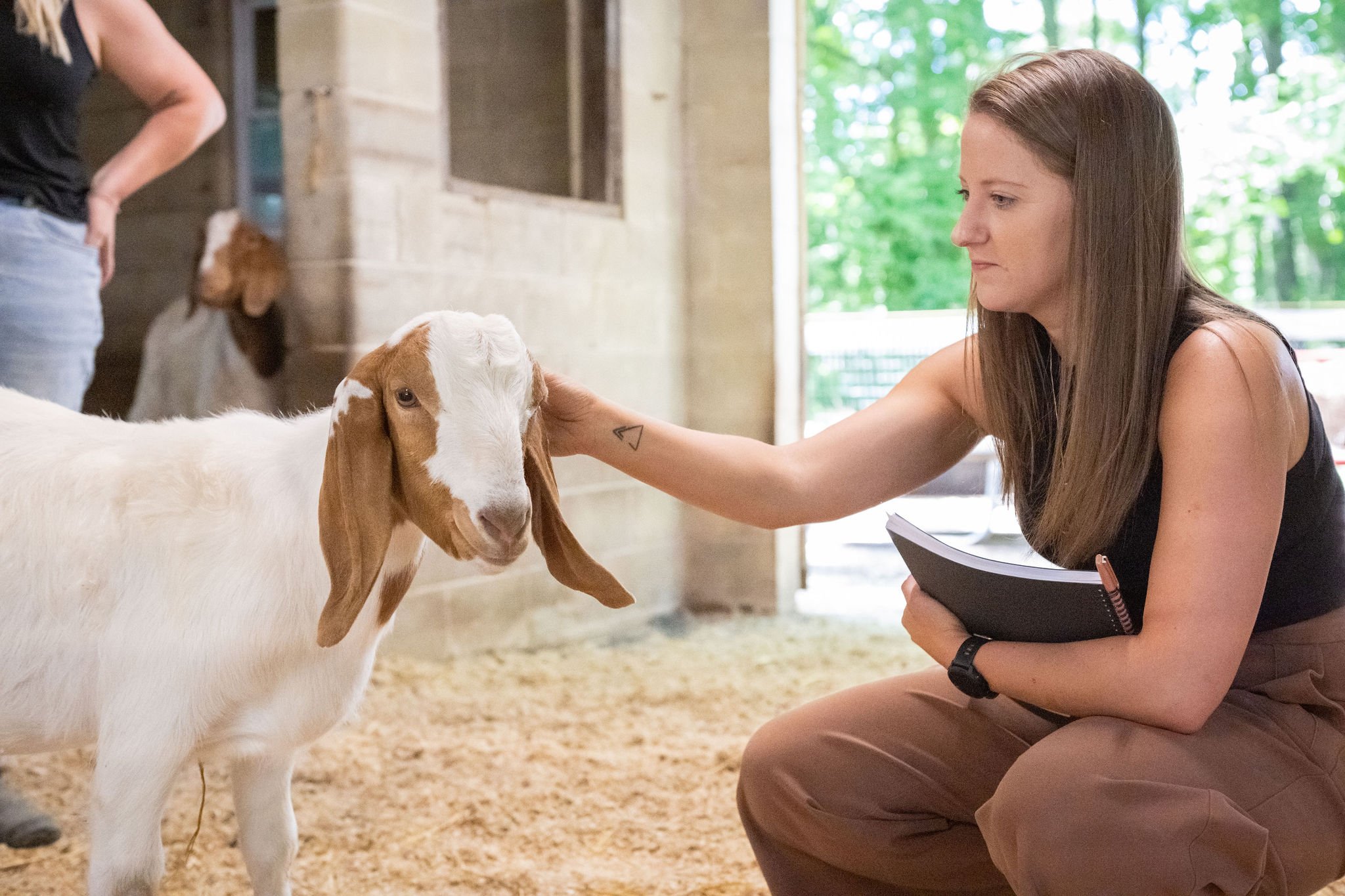Brittney Kane of Foreverland Farm: Changing the World One Animal at a Time
Women of Cincy sat down with Brittney Kane, co-founder and executive director of Foreverland Farm to learn about her journey with this sanctuary for farm animals. Foreverland Farm’s mission is to provide a permanent, safe home and daily care for the most vulnerable animals, including those abandoned, abused, neglected, and slaughter-bound, while sharing their stories of survival and perseverance to create a more compassionate community.
Brittney’s love and admiration of the animals was front and center throughout our conversation and visit to the farm. She knows each of her 90 animals at the sanctuary intimately and cares deeply about providing them safety and peace to live out their days. Her compassion for these animals knows no bounds.
Interview by Melanie Schmid. Photography by Stacy Wegley.
Tell me a little bit about yourself.
I am a licensed social worker, so my job is psychotherapy – I own a private practice. And then, of course, I run Foreverland Farm. My background was in homeless services, so that’s what I did for a long time. But when we started the sanctuary, that took a lot more time and energy, so I had to step away from my therapy role. Now I work part-time as a therapist while running Foreverland Farm.
I grew up in Massachusetts, so I’m a transplant here. By the time I graduated high school, my mom had already been living out here in Kentucky, and I didn’t really know what I was going to do. I didn’t really have any plans for college, so I decided to spend some time with my mom, and then I never left!
Tell me about the origins of the farm, and how that idea came about?
I have always loved animals. I started riding horses when I was five years old – my mom got me into riding lessons, and I was always the horse girl. When I got older, I just started to align my values more with the way I was living. I love animals, so I stopped eating meat, and then I became vegan. From there, I started learning about the plight of farm animals, because I had no idea. I saw through social media other people were starting to rescue farm animals. You see a lot of cat and dog rescues, and even horse rescues, and that’s amazing, but I didn’t realize other animals that needed rescue, too – goats, sheep, chickens, pigs, etc. I already had some horses I had rescued at that time, and I knew what I was doing as far as horses go, so maybe I could extend this to other animals as well? It can’t be that much different, right? Um, I was wrong! It is very hard, and it is very different.
My spouse might not have been completely on board at the time, but they are now! We decided we were going to buy a piece of land, some property, and see if we could start actually rescuing animals. We started with the horses we had already rescued, who we had been boarding at other properties before purchasing our own land. We now operate out of two sites – our home site and a separate facility a mile up the road, which is just for horses. The homesite property is only five acres. The horse facility is 17 acres, and the horses have pastures they’re able to live in.
We incorporated as a non-profit in 2018, so this is our fourth year of official operation.
What does the rescue process look like?
The animals come from a lot of different places. Now that we’re pretty well-established, people will reach out to us. I get asked pretty much daily to take in animals.
Do you ever have to say “no”?
Oh, I have to say “no” every single day. I have to say “no” 99% of the time. That’s due to space, capacity, resources, money, staff, etc. Right now, we’re at capacity and have been at capacity.
Some animals come from commercial and production farms. A lot of our sheep have come from places like that. In the case of sheep, it’s usually female sheep who have been on breeding farms, so if they can’t breed, or they’re getting old, or are no longer useful to the farm, they will either be killed or sometimes the farm will reach out to us to take them in for sanctuary.
How do you approach a situation of farm animal neglect or hoarding?
When we discover cases of neglect, we try to approach the situation with compassion and build a relationship with the individuals. That tends to lead to the best results for everyone, especially the animals. Many factors are at play when you encounter a neglect and/or hoarding situation. But I do feel that, with my psychotherapy background, I’m able to bring that strength to the table to handle that kind of situation.
In a lot of these hoarding or neglect cases, people will say, “I’m a rescue too,” but that’s just not the case when you show up and see it for yourself. It might have started with that intention, but at some point, it’s gotten out of hand.
Why don’t we hear more about farm animal hoarding and neglect, in the way we do with cats and dogs?
I think that maybe the public doesn’t have as much of an emotional connection to farm animals because we’ve been taught not to. With food and production animals, we have this huge disconnect. Since these aren’t “companion” animals, they just don’t see them in that indoor, cuddly way. But they are somewhat cuddly, and sometimes they do come into the house [chuckles].
That’s why we really love when people come to visit, we can show them, and they can interact with the animals because they say, “Oh, I had no idea that a chicken has a personality!” and yes – they all have different personalities and quirks! It’s cool to see people make that connection because not only do we not see them in the media, but you don’t really have opportunities to interact with animals like that.
What does a day look like for you on the farm?
People think I get up super early, but it’s not that early – I’m usually up around 7 a.m. I come and let everybody out and feed them breakfast, make sure they have water, and then we go about what we need to do based on the day. It’s a lot of cleaning; there’s always something to fix, and there’s always a feedstore run to go on. Keeping everything stocked is just a never-ending cycle!
We have five part-time staff with rotating schedules. They’re not here every day, but they’ll come in the morning or evening and feed, clean, and take care of the animals. I would love to have more staff and full-time staff for the extra help. And actually, this is the first year since starting the organization in 2018 that I’ve taken any kind of partial salary.
What was an unpredictable hurdle that you encountered when starting Foreverland Farm?
I don’t think I actually knew how much of a commitment this would be. It’s not like starting most other nonprofits, because we’re taking care of living beings. We have to take care of them 24/7. I’ve worked in the nonprofit sector before, but that was with established organizations. Building something from the ground up, I’ve learned a lot. I still learn every day!
How do you secure your funding to support your operations?
Primarily, we get a lot of private donations. A lot of our fundraising success has come from social media, which has been great for us. There aren’t a ton of grants out there for farm animals, so that’s a challenge. We’re starting to see a few more, but most of the animal grants are focused on companion animals, not farm animal sanctuaries. There are some other farm animal rescues that will, for example, adopt their goats out after they take them in. We don’t typically do that. For sanctuary, it means they’re going to live out the rest of their lives here because they’ve already come from a bad situation, and they just need something stable.
Does Foreverland Farm do any advocacy work for farm animals?
We’re not currently involved in any of that, but Farm Sanctuary, which is one of the first and largest farm animal sanctuary organizations in the country, is very much focused on legislation and advocating for the rights of farm animals. They work on shutting down inhumane practices, factory farms, etc. We’re not quite at that level yet, but the work that they do is really great. There are other organizations that will also do undercover investigations at factory farms. It is really about bringing light to what happens at those farms in hopes that the public makes more informed decisions about their lifestyle. We certainly advocate in our own way, which might not be in D.C., but we are able to share the animals’ stories to bring education and awareness here locally.
When can the public come to visit the farm?
We have visitor days throughout the summer and through the fall for the public to be able to visit and see the animals. It’s more of a wander around on your own experience. We have our volunteers and staff set up in the different animals’ areas to provide information on the animals and answer any questions. All our visitor days always completely sell out, so we typically have a couple of hundred people able to visit the farm each year.
Do you have a moment that stands out from your time in starting the farm?
Oh, I have so many! We’ve always said we wanted to create a safe space obviously for our animals, but for our people as well. My spouse and I are in the queer community, and it’s hard living in rural Ohio being a queer woman running a vegan farm animal rescue – it’s a little different for this area. We wanted to create a safe space for our people as well. One of our employees shared with me when she first got hired that she loves farm work, and this is what she wants to do full-time, but she was having a really hard time finding a space because she’s also a queer woman. One of her past employers actually fired her when they found out she was queer because she has a Pride tattoo. She told me, “I’m so thankful to find a place like this that is accepting and loving, and it’s the work I wanna do!” And I’m so proud that we can be that place for people.
What does success look like for you?
Our staff is incredible. They all just celebrated their two-year anniversary with Foreverland Farm. Every staff member we have hired is still with us – no one has quit, so that has to be a testament to something! I’m proud of having staff that cares so much about the animals. I’m proud of creating spaces that are conducive to them and safe. There are things we could do better and want to do better, but I am really proud of our growth in the last couple years. And I feel like we have a lot more we can do.
To continue to grow, we’re working on a capital campaign. We’re looking for a new property with a minimum of 50 acres. Ideally, we’d like it to be somewhat established with a home on the property for my spouse and I to live in. We want it to be set up for equines, with some established pasture and some barns. We’ve had to build literally everything here at our current site except for the barn – the barn was the only thing here. We don’t really want to do that again [laughs], but we can if we have to! But we’d love to find a property that’s somewhat ready for our animals to move into. And we want it to be close to where we are now, with our relationships with our vet, feed store, hay supplier, etc.
In terms of the timeline for completing the capital campaign and moving, we could move tomorrow if we had a space! But we truly aren’t in a rush to move. All the animals we have currently have a good setup and everything they need, but we can’t take in any more animals or have the community engagement we want if we don’t find a bigger space. We’d love to have a community garden, vegan cooking classes, yoga classes, and so much more, but we’re so limited with what we can do here, which is why the bigger space will be so nice.
What’s giving you hope at the moment?
The animals always give me hope. Some of them have been through things we can’t even imagine, and they’re still so loving and so trusting. They always give me hope, even when things get tough. The people that support Foreverland always give me hope too. I used to feel like I was alone doing this, and I don’t feel that way anymore because we have so many great volunteers, donors, and supporters. The outpouring of love that we get definitely gives me hope.
Tell me about the animals!
We have about 90 animals – horses, sheep, goats, ducks, chickens, turkeys, one alpaca, pigs, and more. We have so many stories.
I’ll start with Champion, the three-legged goat. Champion actually didn’t come from a bad situation. He was born with three legs, and when animals are born with deformities or are small and weak, the mom will sometimes reject them. The mom doesn’t want to waste her resources if the baby doesn’t have a good chance of making it. He was rejected as a baby, and the people who had him tried to bottle feed him, and they were raising him in the house. When they tried to reintroduce him back into the herd, they were just bullying him pretty badly. His owners reached out to a special needs goat sanctuary in New Jersey, but they were unable to take him, so they were then connected to me, and they were only about 30 minutes away from us. We weren’t sure if he was going to be able to fit in with everybody, but we said hey – let’s try it out! And now he gets along with everybody. He was the first goat we ever rescued. We only had sheep at the time. He’s been here for about four to five years. And yes, he is named after the three-legged dog in the TV show Parks & Recreation.
Another memorable story is when one of our rescued sheep, Agatha, was found running down I75 by Northside, and we got a phone call about this loose sheep! She had to have fallen off a truck – there’s no other way she would have gotten there. After we got that call, we headed out to find her. We eventually found her, but sheep are always very scared, so she ran away from us again. And this was around the highway, the train tracks, and the river. It was an unsafe place for her to be. We were out there all day - it was cold, it was raining, and we couldn’t catch her. Then it got dark, and we still hadn’t caught her, so we decided to head back home and would come back the next day. The same thing happened the next day – we were chasing her around all day, and it got dark, so we were going to head back.
Then my friend, Garrett, decided to check this one other area we hadn’t searched yet on our way back. The terrain isn’t great, and Garrett and I got separated. Then I got a phone call saying, “Garrett has her!” And my first reaction is “HOW?!” She’s like 200 pounds. I ran back over to him, and he’s holding onto her for dear life, and he tells me he’s pretty sure he broke a couple of fingers in the process [laughs]. So we got her loaded up, and we found out that she had been out there for months on her own, and no one, including animal control, was doing anything. It took us two days, but we got her. She’s here now and living her best life.
And then there’s Iggy, one of our pigs, who loves to escape. She loves to run over to my neighbor’s house, and I’ll get a call saying, “Brittney, the pig is by the pool.” And I’m like, “I’m so so sorry!” And she’s 600 pounds, and there’s no stopping her. I’ve chased her up and down the road before with people driving by. I can only imagine what they’re thinking seeing this giant pig running with a woman chasing after it. Pigs are way too smart, and if they find a way out, they’re going to take it!
Who is an influential woman in your life and why?
There are so many – oh my gosh. I can’t pick one. Truly, my answer has to be all of the women we have here at Foreverland Farm. Our entire staff is women, and all of them are just total badasses. All our volunteers are also women. We’ve built this community of empowered women who have really found their voice through this work. When we do all the hard, manual work that comes with running a farm, we’re like, “Hey, look at us! We’re really awesome!”
Women of Cincy is a certified 501(c)3. This belongs to you. Consider supporting future stories with a donation.
Do you know an awesome Cincinnatian? Nominate them here! New features launch on Mondays.

